Learning about Canadian elections
Today we’re welcoming two guest bloggers from Maria Kenward’s LINC 7/8 class at Windsor Neighbourhood Learning Centre. They write about their successful experience learning about elections in Canada.
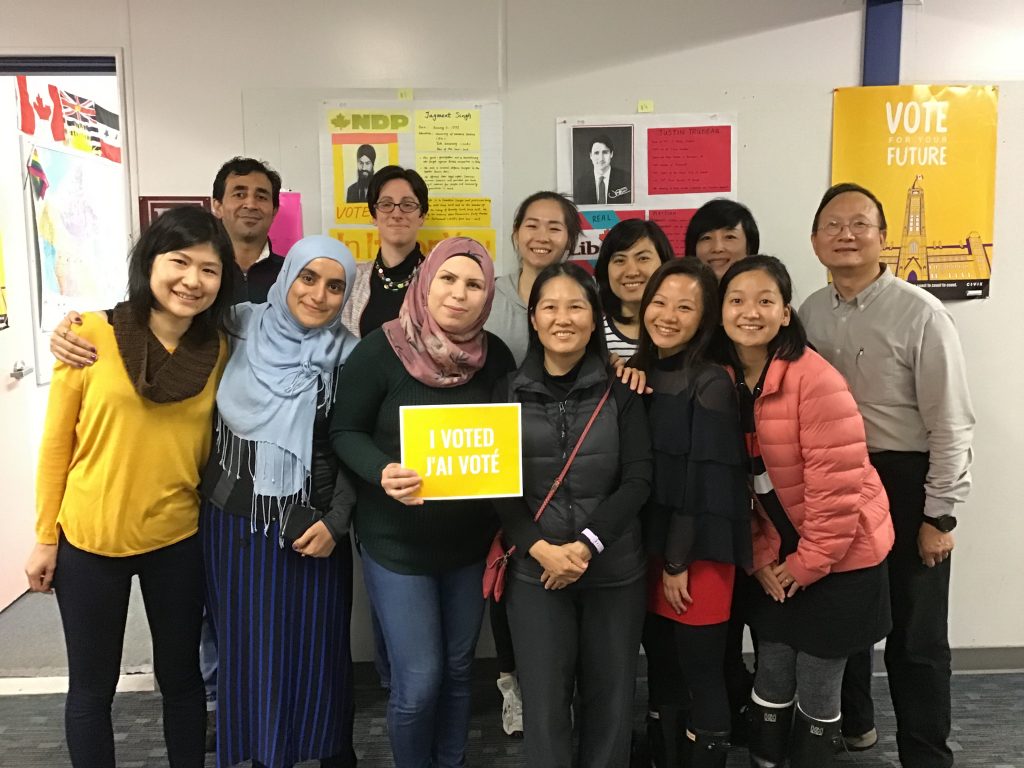
My first time experiencing and learning about an election in Canada by “Charlotte”
Is there anything that could be nerve racking for people in Canada for as long as 40 days? Is there anything that could make most Canadians sleepless for the whole night on October 21st? Is there anything that you could think of as exciting as hockey in Canada? I couldn’t have imagined myself being immersed in such a fascinating thing if I were not introduced to it by Maria, our LINC 7/8 teacher at the Windsor Neighbourhood Learning Centre this October.
Well, this fascinating thing was the election! As a matter of fact, the topic was politics and not something that I am used to talking about. Politics is a sensitive subject in my first country, mainland China. Although as a Permanent Resident, I am not allowed to vote yet, to be able to know about the political and election systems here in Canada makes me feel that I am not excluded or rejected. So, I cherished this learning opportunity a lot.
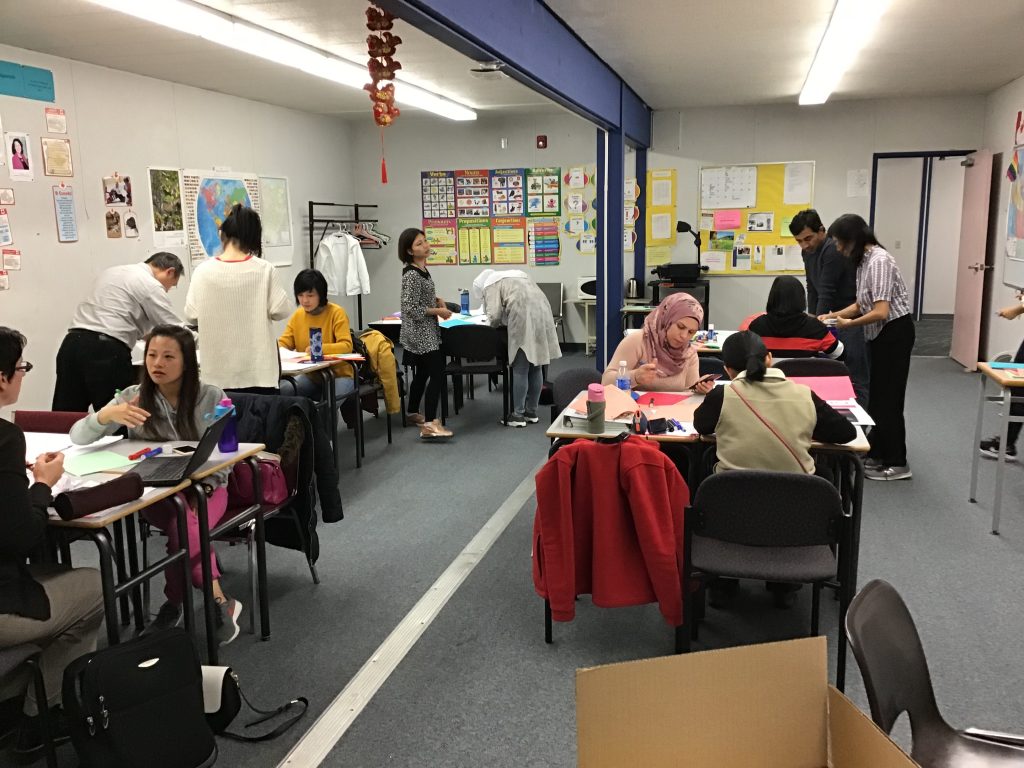
Starting from learning how to persuade, I worked with my classmates Gabbie and Sam, to present our party, the NDP. We managed to create a satisfactory poster thanks to Sam’s expertise in graphic design. We then allocated our time evenly to do a verbal introduction of the NDP leader, the party and their platform. It turned out to be a wonderful experience to feel in some way, the democracy in Canada. The class we had for all of our presentations was so exciting that it made me feel like we were all stars in a real live show. And no doubt, it was also an excellent way to practice our English-speaking skills. The most unforgettable part was that, in order to do my part of job well, I made a matrix which compared the platforms of all the parties. I thought it was the only way to know the differences among all the parties and who excelled in which field. It took me half a day to work out this chart. Having no Excel software in my Mac, I did it all by hand. It was quite a lot of work, but I enjoyed it. Wasn’t it awesome to know the leaders’ minds!
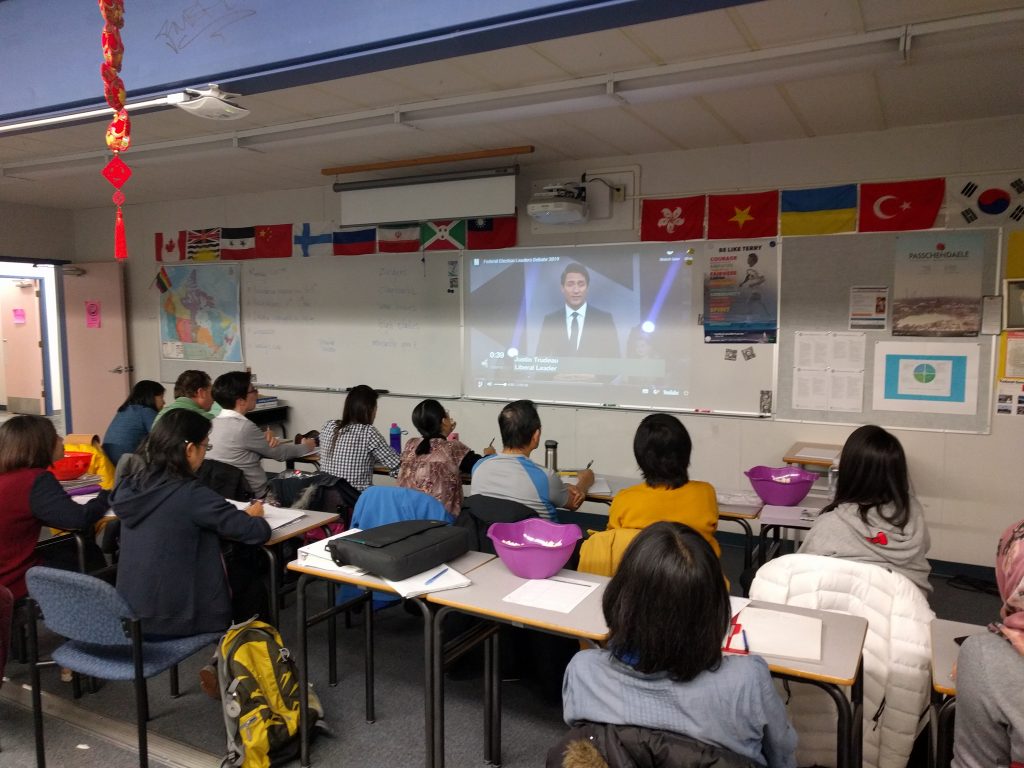
Along this learning process, I also understood generally the political system at different levels by watching the video clips on the Edulinc, our class website. Then the most challenging part for my listening practice was watching the candidates’ debate. Fortunately, we watched it together class, which made it easier to understand. With the teacher’s explanation of terms, vocabulary and perspectives I enriched my knowledge, learned various political opinions and accepted as well as respected the differences among us. It was a lot of fun too!
Further on, I completed Vote Compass online to evaluate my political position. After gaining more knowledge of the system throughout the learning process, I did it again to better know my position. I must have enjoyed it enough to do it twice.
Finally, we had the mock student vote. Only by being able to teach others could we actually master the knowledge. Teaching other schoolmates demanded us to be clear-minded ourselves first. It also made me feel useful and valuable with what I had learned. I was so relaxed to see that the schoolmates I taught went through the mock election process without making any mistakes. It was definitely a good feeling of being a teacher.
To conclude our study of the topic, everyone wrote blogs, shared with classmates and we edited each other’s articles. By writing my own article and learning from others, I practiced my writing skills. It is also an excellent opportunity for us to learn how to follow instructions and respect each other while doing teamwork. This is just amazing! It is the first time that I witness the election here in Canada, and I have learned so much from it! I would say that I really
appreciate the design of our LINC class. It is not doctrine of textbook but so up-to-date, full of vitality, practicum and comprehensive practice for improving English skills. And politics? It can be a day-to-day topic, exciting and so close to our lives! Benefited from this learning, I have made a habit of keeping myself updated of the everyday news.
Activities and Experience with Canadian Elections by Ava Gao
My name is Ava, and I am studying English in the LINC 7/8 Class at Burnaby Windsor Neighbourhood Learning Center. LINC is short for Language Instruction for Newcomers to Canada. Are you curious abut how we study in our classes and learn a new topic? Please continue reading my blog to find the newcomers’ experience on election topic and discover the colourful contents of our classes.
Every four years, October is usually busy with Canadian federal elections. This October, our LINC 7/8 teacher Maria had a new topic for us, which was about this Canadian federal election. In order to help us know more about Canadian elections, she assigned us with different kinds of activities, such as listening activities, persuasive presentations, reading tasks and a Student Vote activity.
In the first week of October, Maria provided us with some listening materials from YouTube about democratic principles, government democracy, the levels of government and federal elections. For me, that was not enough to understand how the government was elected. So I searched other websites to throw more light on the Canadian political system. Luckily, I learned some basic knowledge to do my task easily. Next, I surfed the web for information and news on the Conservative leader Andrew Scheer to prepare for our group persuasive presentations. We also made posters for our presentations.
In the second week, we had five persuasive presentation groups presenting the five different parties’ leaders. The presentations were not only our assignments but also helped us to know more about other parties’ platforms, leaders’ experience and achievements. We also watched the federal election leaders debate in class and sorted our thoughts after class. Besides, we discussed our thoughts and some new vocabulary and phrases of the debate in the following class.
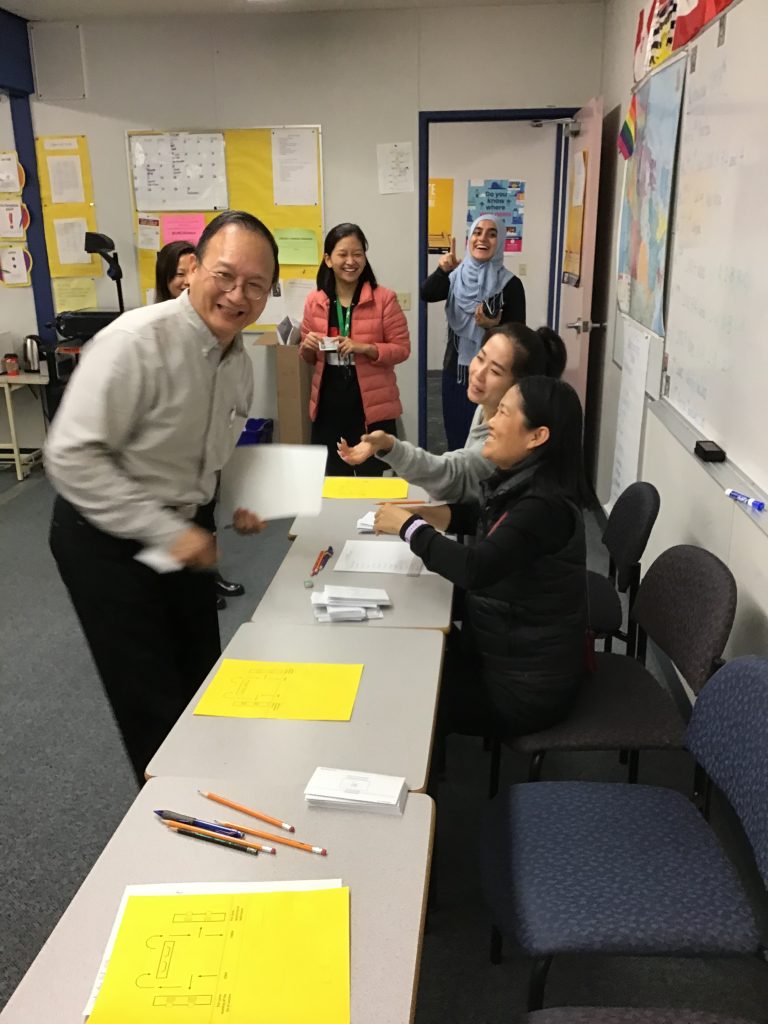
In the third week, we studied the procedures of the election. For example, who can vote? How does one prepare to vote? In such a case, Maria introduced the Student Vote which was an activity of role play. First, all of us were polling clerks at the station and studied information Maria provided so as to be professional in the role play. Second, we explained vote procedures to LINC 3 and 4 students. Third, we set up our classroom as a polling station to hold voting. Fourth, we lead LINC 3 and 4 students to vote orderly as clerks. Fifth, we counted the ballots. It was an interesting activity and time passed very fast.
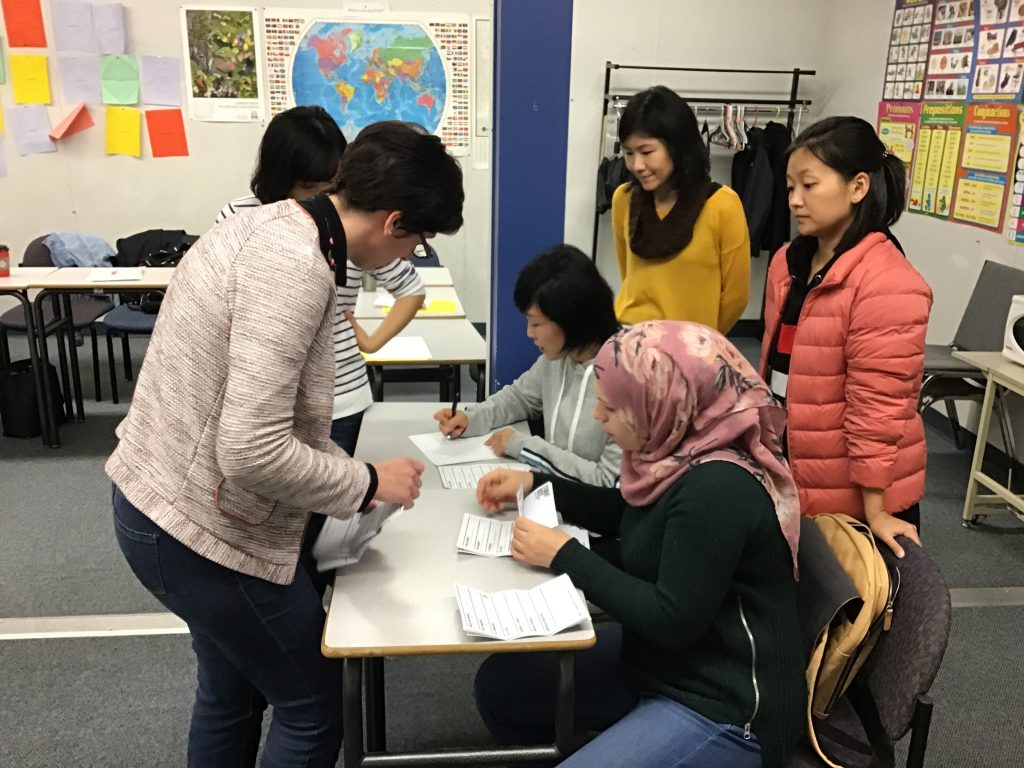
In a word, it was a wonderful and knowledgeable month. I learned lots about federal elections rules and the Canadian government system, and even more so, about the sacred responsibility of voting. Due to my teacher’s many resources and logical arrangements, as well as my classmates’ fantastic cooperation, our preparation and activities proceeded well.
Related Blog Posts
Financial Literacy in Challenging Times
COVID has had a big economic impact. That’s why this year’s focus for Financial Literacy Month is helping Canadians learn how to manage their finances in challenging times. The Financial …
The Importance of Enunciation
Learn about common mistakes and how to improve your enunciation.
Listening Practice – 6 Minute English
Find online listening activities in 6 Minute English.
